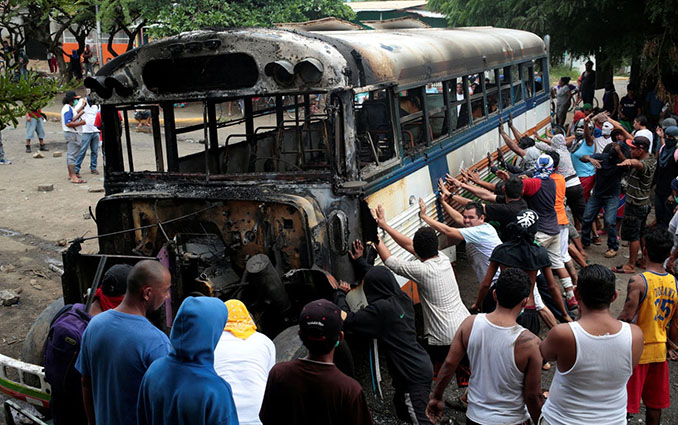TIPITAPA, Nicaragua, (Reuters) – Thousands of shopkeepers and businessmen in Nicaragua yesterday heeded calls for a national strike by foes of President Daniel Ortega, shutting down much of the country after nearly two months of deadly protests urging his ouster.
Streets were deserted in cities and towns as banks and supermarkets, gas stations and corner stores were closed. Few people ventured out during the 24-hour stoppage.
Police officers with assault rifles lined the largely empty main streets of the capital Managua. The strike, organized by university students, farmers and business owners, was the latest tactic by a loose national alliance formed to dislodge the president.
“Look at this, it’s a desert,” said Juan Jose Murillo, 38, pointing to a vacant parking lot and the empty stalls of the usually bustling Huembes market, a central shopping destination.
Murillo, a street vendor, said he has struggled to make a living since demonstrations started. “I don’t support any political party. I just want the conflict to end.”Ortega’s attempt to push through welfare cuts in April kicked off the bloodiest confrontations since a civil war ended in 1990. The government of the former Marxist guerilla and leader of the Sandinista rebel movement quickly dropped the planned welfare cuts. But the crackdown on protesters has sparked his biggest crisis since his second stint as president began in 2007.
Nearly 150 have been killed and hundreds injured in eight weeks of clashes between pro-Ortega forces and protesters armed with rocks, slings and homemade mortars.
In a statement yesterday, the Ministry of Foreign Affairs rejected as “biased” the Inter-American Commission on Human Rights’ condemnation a day earlier of ongoing state-sanctioned repression. The commission released a scathing preliminary report in late May criticizing “grave violations of human rights” during a government crackdown.
Ortega’s administration has said protesters are vandals trying to destabilize his government and undermine democracy in one of the Western Hemisphere’s poorest countries.
A new round of talks between the government and civil society representatives were scheduled for today.
A previous round mediated by local Catholic bishops was suspended in late May after witnesses and rights groups accused government security forces of opening fire on thousands of demonstrators.
A few blocks from blood-spattered street barricades in Tipitapa, 13 miles (22 km) northeast of Managua, the silence was rent by cries of sorrow as relatives and friends gathered around the body of Agustin Mendoza, 22, his coffin streaked in the blue and white of the national flag.
Masked gunman in civilian clothes shot Mendoza on Thursday morning as he was filming nearby clashes, according to a mourner who said Mendoza was a cousin. Video footage from a relative shows someone sprinting through a dispersing crowd of protesters and a bearded Mendoza falling to the ground, his jeans soaked in blood from a stomach wound.
Down the street, dozens of young men covering their faces with shirts and holding homemade mortar launchers vowed defiance.
“They will have to kill us all,” said a masked youth who identified himself only as Joel, with the carcass of a burned down bus behind him. “We will not back down.”

